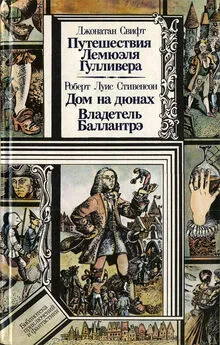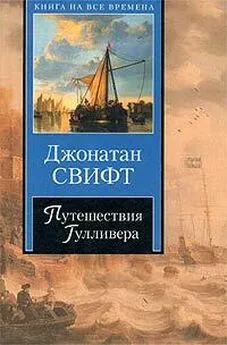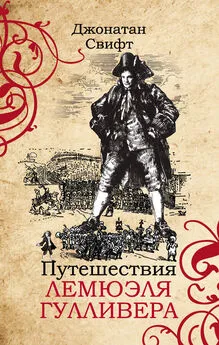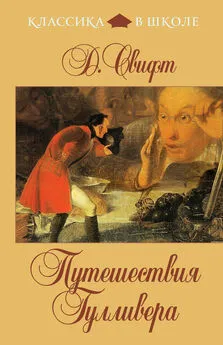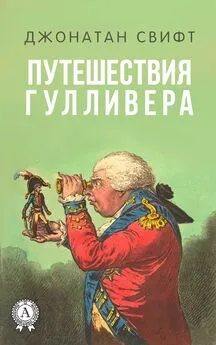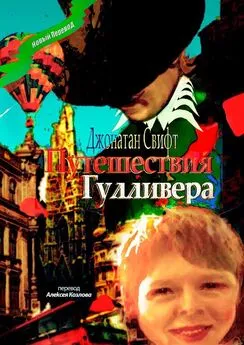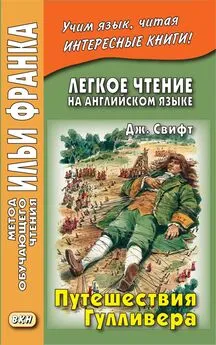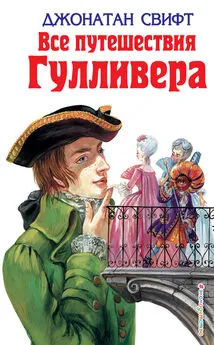Джонатан Свифт - Английский язык с Джонатаном Свифтом. Путешествия Гулливера
- Название:Английский язык с Джонатаном Свифтом. Путешествия Гулливера
- Автор:
- Жанр:
- Издательство:неизвестно
- Год:2008
- ISBN:нет данных
- Рейтинг:
- Избранное:Добавить в избранное
-
Отзывы:
-
Ваша оценка:
Джонатан Свифт - Английский язык с Джонатаном Свифтом. Путешествия Гулливера краткое содержание
Английский язык с Джонатаном Свифтом. Путешествия Гулливера - читать онлайн бесплатно ознакомительный отрывок
Интервал:
Закладка:
September [sep'tembq], o'clock [q'klOk], ate [et, eIt]
I set sail on September 24th, 1701, at six o'clock in the morning. At six o'clock in the evening I saw a small island to the north-west, where I dropped anchor. I ate some food and slept well for about six hours.
The wind was favourable (ветер был попутный: «благоприятный»), so I steered the same course as the day before with the help of my pocket-compass (и я взял с помощью карманного компаса тот же курс, что и накануне; to steer — править рулем, управлять; вести /судно/; следовать, идти /по определенному курсу/; before — впереди; прежде, раньше ). I wanted to reach Van Diemen's Land (я хотел достигнуть Земли Ван Димена). I saw no land that day (в тот день земли я не увидел), but at about three in the afternoon of the next day (но около трех /часов/ пополудни следующего дня) I saw a sail steering to the south-east (я увидел парусное судно, двигавшееся на юго-восток).
favourable ['feIv(q)rqb(q)l], compass ['kAmpqs], south-east ["saV(T)'Jst]
The wind was favourable, so I steered the same course as the day before with the help of my pocket-compass. I wanted to reach Van Diemen's Land. I saw no land that day, but at about three in the afternoon of the next day I saw a sail steering to the south-east.
I hailed her, but got no answer (я окликнул его: «ее», но ответа не получил; при обозначении судов часто используют местоимения женского рода ). I sailed nearer and in about half an hour she saw me (я подплыл ближе, и где-то через полчаса он = корабль заметил меня), hung out her flag (вывесил = поднял флаг) and fired a cannon (и выстрелил из пушки). It is not easy to express the joy I felt at the hope (нелегко выразить = трудно описать радость, которую я ощутил, когда явилась надежда: «при надежде») of once more seeing my beloved country (вновь увидеть любимое отечество). My heart leapt (мое сердце забилось сильнее /от восторга/; to leap — прыгать, скакать; забиться сильнее /от испуга, радости; о сердце/; взыграть ) to see a British flag on the ship (когда я увидел британский флаг на корабле). I got aboard with all my cows (я взошел на борт со всеми моими коровами), sheep and provisions in my pockets (овцами и провизией в карманах).
beloved [bI'lAvId, bI'lAvd], leapt [lept, lJpt], aboard [q'bLd]
I hailed her, but got no answer. I sailed nearer and in about half an hour she saw me, hung out her flag and fired a cannon. It is not easy to express the joy I felt at the hope of once more seeing my beloved country. My heart leapt to see a British flag on the ship. I got aboard with all my cows, sheep and provisions in my pockets.
The captain of the ship, which was returning from Japan (капитаном корабля, который возвращался из Японии), was Mr John Biddel of Deptford (был мистер Джон Бидл из Дептфорда). He was a very kind man (человек очень любезный) and an excellent sailor (и превосходный моряк). There were about fifty men on board (на борту находилось около пятидесяти человек). I met an old friend, one Peter Williams (я встретил одного /моего/ старого товарища, Питера Вильямса; one — один; некий ), who assured the captain of my good character (который заверил капитана в моей добропорядочности; character — характер, нрав; репутация ). When I told him where I had come from (когда я рассказал ему = капитану , откуда я приплыл), he thought I was mad (он решил, что я сумасшедший). They thought the dangers I had experienced (они подумали, что опасности, которые я пережил; experience — /жизненный/ опыт; to experience — знать по опыту; испытывать, переживать ) had disturbed my mind (повредили мой разум; to disturb — приводить в беспорядок; портить ). But when I showed them the cattle and sheep in my pocket (но когда я показал им коров и овец /бывших/ у меня в кармане; cattle — скот /особенно крупный рогатый/; коровы и быки ), they knew I was telling the truth (они поняли, что я говорю правду; to know — знать; понимать, осознавать ).
Japan [Gq'pxn], assure [q'SVq], character ['kxrIktq]
The captain of the ship, which was returning from Japan, was Mr John Biddel of Deptford. He was a very kind man and an excellent sailor. There were about fifty men on board. I met an old friend, one Peter Williams, who assured the captain of my good character. When I told him where I had come from, he thought I was mad. They thought the dangers I had experienced had disturbed my mind. But when I showed them the cattle and sheep in my pocket, they knew I was telling the truth.
I also showed them the gold and the picture (также я показал им золото и портрет) the Emperor of Blefuscu had given me (которые мне дал/подарил император Блефуску). I gave the captain a present of four hundred sprugs(я вручил капитану четыреста спругов: «дал подарок в виде…» )and promised to give him a present of a pregnant cow and sheep (и обещал подарить ему стельную корову и овцу; pregnant — беременная; стельная /о корове/, суягная /об овце/ и т. д. ) when we arrived in England (когда мы прибудем в Англию).
gold [gqVld], present ['prez(q)nt], cow [kaV]
I also showed them the gold and the picture the Emperor of Blefuscu had given me. I gave the captain a present of four hundred sprugsand promised to give him a present of a pregnant cow and sheep when we arrived in England.
We arrived in England on April 13th, 1702 (мы прибыли в Англию 13 апреля 1702 года). I put my cattle to graze on a bowling green at Greenwich (я пустил свой скот попастись на лужайке для игры в шары в Гринвиче; green — зеленый; зелень; лужайка, луг ), where they fed heartily on the fine grass (где они с удовольствием поедали тонкую и нежную траву; to feed — кормить; питаться, кормиться; heartily — сердечно, от всего сердца; охотно, усердно; fine — прекрасный, превосходный; изящный; тонкий, мелкий, нежный ). I couldn't have kept them alive (я не смог бы сохранить: «сохранить живыми» их = этих животных) on such a long voyage (в течение столь долгого путешествия) if the captain hadn't given me some of his biscuits (если бы капитан не давал мне своих галет; biscuit — сухое печенье; галета ), which, mixed with water, was their best food (которые, смешанные с водою = размоченные в воде , были их = для них лучшей пищей).
April ['eIprql], Greenwich ['grInIG,'grenIG], biscuit ['bIskIt]
We arrived in England on April 13th, 1702. I put my cattle to graze on a bowling green at Greenwich, where they fed heartily on the fine grass. I couldn't have kept them alive on such a long voyage if the captain hadn't given me some of his biscuits, which, mixed with water, was their best food.
For the short time I stayed in England (за /то/ короткое время, что я оставался/пробыл в Англии) I made a good profit (я собрал значительную сумму денег; profit — прибыль, доход ) showing my cattle (показывая моих животных). I sold them for six hundred pounds (я продал их за шестьсот фунтов; to sell ) before beginning my second voyage (перед началом своего второго путешествия). The breed has increased since my return (со времени моего возвращения их племя выросло/размножилось; breed — племя, порода, род; потомство; to increase — возрастать, увеличиваться; расти; размножаться ), especially the sheep (особенно овцы). I hope their fine fleece will improve the wool business in this country (надеюсь, что их превосходная/тонкая шерсть поможет поправить положение суконной промышленности в этой стране; fleece — овечья шерсть, руно; wool — шерсть; шерстяная пряжа или ткань; to improve — улучшать; поправлять, налаживать ).
profit ['prOfIt], sold [sqVld], especially [I'speS(q)lI]
For the short time I stayed in England I made a good profit showing my cattle. I sold them for six hundred pounds before beginning my second voyage. The breed has increased since my return, especially the sheep. I hope their fine fleece will improve the wool business in this country.
I stayed with my wife and children for two months (я провел с женой и детьми два месяца). My desire to see foreign countries (мое страстное желание видеть чужие страны) wouldn't allow me to stay any longer (не позволяло мне остаться дольше). I bought a nice house at Redriff for my family (я купил для семьи хороший дом в Редрифе; to buy ) and left a large sum of money with my wife (и оставил жене большую сумму денег).
desire [dI'zaIq], foreign ['fOrIn], bought [bLt]
I stayed with my wife and children for two months. My desire to see foreign countries wouldn't allow me to stay any longer. I bought a nice house at Redriff for my family and left a large sum of money with my wife.
When I set off (когда я отправлялся в путь), hoping once more to improve my fortune (снова надеясь увеличить: «улучшить» свое состояние; fortune — счастье; удача; богатство, состояние ), all of us were in tears (все мы: «из нас» были в слезах). I boarded the merchant ship Adventure(я сел на купеческий/торговый корабль "Адвенчер"; to board — подниматься на борт /корабля/; adventure — приключение; смелое предприятие; авантюра; риск ),commanded by Captain John Nicholas of Liverpool (под командованием Джона Николаса из Ливерпуля). My story of this voyage is told in the second part of my travels (история этого путешествия рассказывается во второй части моей книги; travels — путешествия; описание путешествий ).
Читать дальшеИнтервал:
Закладка:

